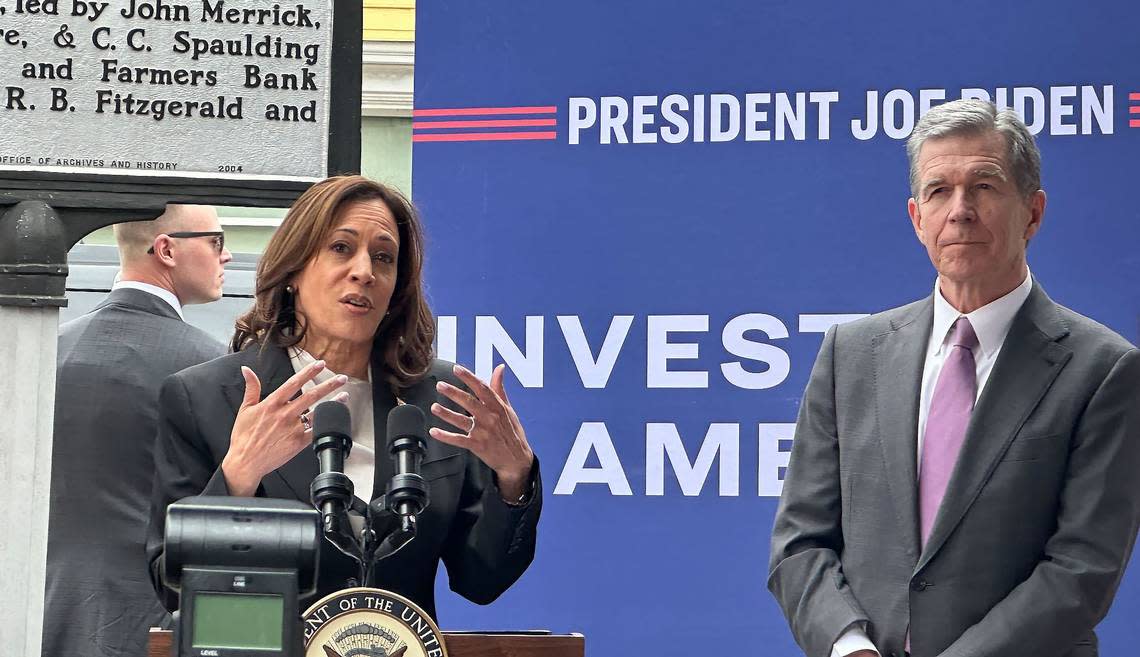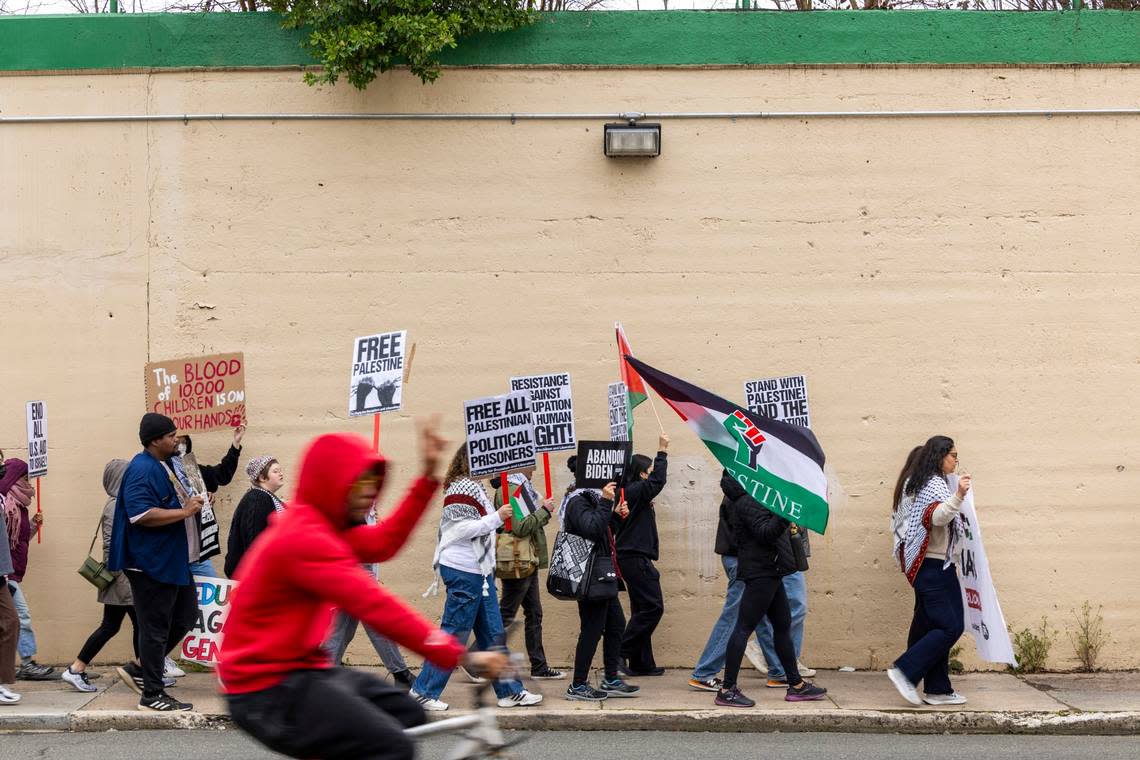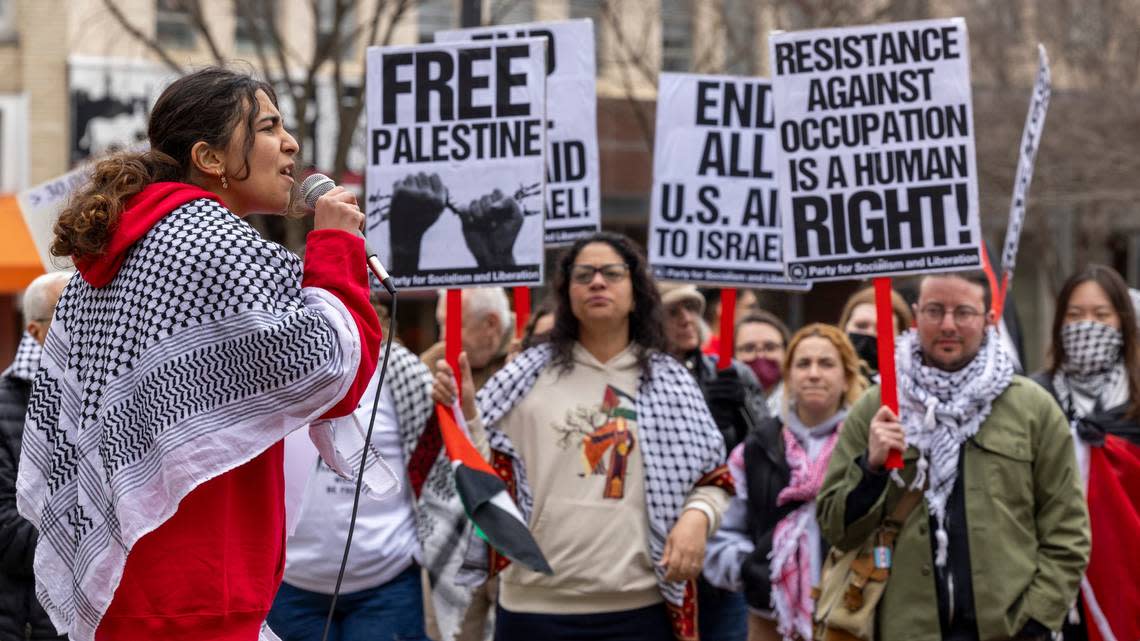VP Kamala Harris, in historic Black business district, announces aid for NC companies
Vice President Kamala Harris announced in Durham’s historic Black Wall Street district on Friday that the federal government is awarding $32 million to help women- and minority-led businesses in North Carolina.
These funds will be distributed to 10 women- and minority-led venture capital firms, or firms that invest in startup companies and small businesses, which will then use funds to support entrepreneurship.
Many of these venture capitalists were present for the announcement Friday on West Parrish Street, just outside of the Ella West Gallery, a Black-woman owned fine arts gallery which opened last year.
According to a White House news release, this will lead to an additional $60 million in private spending in the state.
The firms getting awards include Nex Cubed, RevTech Labs, LaVert Ventures and Latimer Ventures.

“We understand that traditionally minority owned businesses have received a fraction of federal contracts,” Harris said, “often because, relationships are not there, the access therefore is not there, but the talent exists.”
And this spending is not only “a good thing to do,” Harris said, but “ultimately it makes economic and financial sense.”
In December 2021, the Biden administration announced a goal to increase the percentage of federal contract funding going to small businesses owned and controlled by socially and economically disadvantaged individuals.
Harris also highlighted the significance of the location of the event. “I just stand here thinking of what has happened here over the years, both in terms of the strength of the community and then the challenges and the obstacles that were presented to this community but how it has rebounded in such an extraordinary way,” she said.
The district encompassing Parrish Street was dubbed the “Black Wall Street” during the late 19th century and early 20th century, as the Black middle class grew and hundreds of Black-owned businesses lined it.
Still, a large swath of Durham’s Black residents were low-wage and working-class. When the Great Depression hit in the 1930s, Durham’s textile industry and many people there were affected. Desegregation in the 1960s also caused many Black-owned businesses to shut down.
But Parrish Street and Durham over the past decade has seen tremendous growth and efforts to revitalize it.
After her stop — including a visit to the gallery — Harris spoke at the NC Mutual Building to about 100 attendees, also about the spending, according to White House pool reports.

Primary election
The Democratic vice president’s visit comes four days before North Carolina’s presidential primary election on Tuesday and hours before planned visits to North Carolina by the Republican candidates for president, former President Donald Trump and former South Carolina Gov. Nikki Haley.
This visit not only hints at the importance of North Carolina in the presidential race but also the importance for the campaign of harnessing turnout among Black voters and minorities. According to a new poll by the Black to the Future Action Fund, almost 60% of Black North Carolinians said they were very likely to participate in the March 5 primary.
Of those potential voters, nearly 75% said they would cast ballots in the Democratic primary, 13% in the Republican primary and 15% were undecided, according to a news release by the fund, which is an organization that works “to transform Black communities into constituencies that build Black political power in cities and state,” according to its website.
This trip finished the Biden administration’s fourth “Investing in America” tour and is Harris’ second trip to North Carolina this year.
About 100 demonstrators rallied and marched Friday in downtown Durham to protest Harris’s visit, calling for a ceasefire in the Israel-Gaza war. Police temporarily blocked streets to accommodate the protesters as they marched on the sidewalks.
Friday’s protesters also encouraged Democratic voters to vote “no preference,” not for President Joe Biden, in North Carolina’s primary on Tuesday due to his position on the Israel-Gaza war.
Another rally demanding a ceasefire in the conflict is planned for Saturday in downtown Raleigh.

Where does the funding come from?
The money comes from the Treasury Department’s State Small Business Credit Initiative (SSBCI), which was created in 2010 to help businesses after the 2008 housing crisis. North Carolina’s SSBCI funds were awarded to the state in 2022.
It was reauthorized by the Biden administration during the COVID-19 pandemic, through the American Rescue Plan Act of 2021. Congress appropriated $10 billion for the program, to be spread out among states, territories, and tribal governments.
According to a White House news release, this spending is part of the Biden administration’s “effort to ensure that not just loans, but also equity capital investments are available across all of America to entrepreneurs – including Black-, Hispanic-, veteran- and women-led businesses, as well as those in rural areas – that have typically been shut out of these opportunities.”
The White House also said that nearly $3 billion from the program is going to equity-based financing programs nationwide, which is expected to lead to $30 billion in additional funding and private spending over a decade.
Visual journalist Travis Long contributed to this story.
